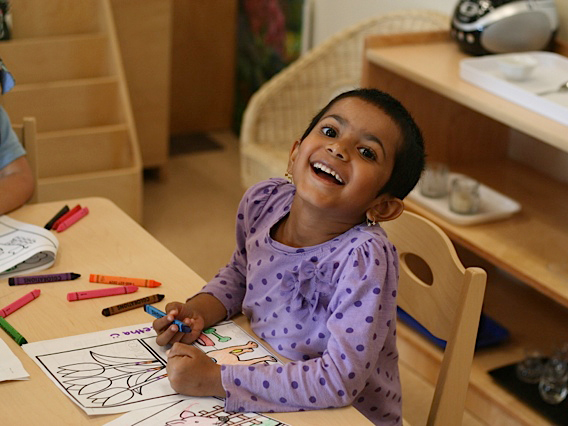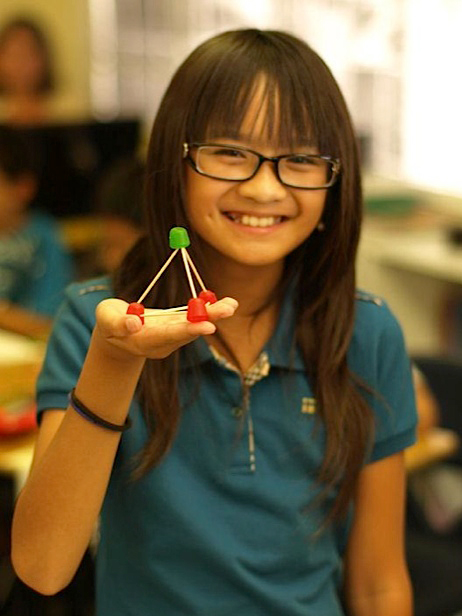The Purpose of a LePort Education: A Child’s Personal Happiness
Throughout the ages, cultures have held different positions on the core purpose of education. Some have seen education as a means to preparing children for war (Sparta), or preparing them for a monastic life (middle ages), or getting them ready for factory work (late 19th century). Intellectuals have argued that education should be aimed at creating a just society (Plato), developing socially conscious adults (John Dewey), imparting universal classical knowledge (Mortimer Adler).
Of all historical conceptions of the purpose of education, the one LePort most identifies with is the approach adopted by the Greek city-state of Athens. The goal of the Athenian education was to enable a child to become the best adult possible, to achieve arête, or excellence, the full realization of his human potential, in body, character, and mind. The ultimate purpose of this excellence was the child’s personal happiness, which he could achieve by living a good life, a life that is, in the words of historian Will Durant, “the fullest one, rich in health, strength, beauty, passion, means, adventure and thought. [The ideal human being] combines beauty and justice in a gracious art of living that frankly values ability, fame, wealth and friends…” *
At LePort, we embrace such an Athenian ideal. We see our purpose as helping our students achieve “the good life”, a life in which an individual uses the full power of his mind to achieve and enjoy chosen values. Whatever ends any child ultimately pursues in adulthood—advancing in a fulfilling career, sustaining a thriving marriage, earning health and wealth, raising children of his own, furthering some important social end—our responsibility is to make sure he has the requisite cognitive tools necessary to achieve those ends. We seek to ensure that each unique, irreplaceable child under our care acquires the cognitive common denominators necessary to achieve a life of personal happiness.
LePort of course does not have a monopoly on student well-being. Many schools share the desire to help students thrive, as is clear from their focus on academic achievement, their efforts to offer students a rich variety of meaningful extra-curricular experiences (theatre, overnight trips, sports), and the dedication with which they pursue their educational program. What makes LePort unique, however, is that our students’ personal fulfillment is our exclusive purpose.
Peruse most schools’ mission statements and you’ll find that in addition to helping students self-actualize, there is also emphasis on inculcating a spirit of public service. Schools pride themselves on encouraging “responsible, global citizenship”, transforming children into “exemplary citizens of a global society”, training students to make “meaningful contributions to the world community.” While there are many variations on the object of the service —the community, the country, religion or faith, the environment — the common thread is that these schools aim to nurture a service mentality in children.
We collaborate with and have deep respect for many schools that take this approach, and we recognize that some parents will want a mission of service as part of their child’s learning environment. But at LePort, we operate on a very different foundation.
Our view is that a child’s purpose is to live his own life according to his own chosen values, in the pursuit of his own happiness. While it’s the mark of an educated mind to be able to take a global perspective on life, we don’t believe it’s our place to prescribe or imply the particular ends a child must serve. What matters to us is not whether a child “makes a meaningful contribution to the world community,” but whether he achieves the things that give his life meaning (which may or may not include making a meaningful contribution to the world community).
Here are a few ways this difference in approach comes up in practice:
- Learning as a child’s highest moral purpose. To encourage children to value the experience of learning, we try to create a culture of curiosity, of genuine interest in understanding and exploration. This means de-emphasizing external motivators (like a bad grade as a punishment or a class party as a reward). It also means not adding any special prestige or importance to so-called “volunteerism” efforts, even when a child chooses it voluntarily. If one child wants to spend her weekend visiting a homeless shelter, and another wants to spend it taking apart a toaster to figure out how it works, we treat both choices with full respect to the extent that both are equally an expression of a desire to learn. We don’t celebrate the first as somehow morally superior, because it involves “service”. We’re much more interested in the process by which a child is making choices—is she pursuing a certain experience based on thoughtful, active reflection about what matters to her, or is she motivated by false prestige, or popularity, or a neurotic need to be first among her peers. We nurture a genuine exploration of life and learning, and leave it up to each individual child to determine how that process unfolds.
- Moral neutrality with respect to career choices. At LePort we don’t treat certain callings—a nurse, a teacher, or joining the Peace Corps—as somehow morally better than a life dedicated to other, more “materialistic” careers such as creating movies, or running a successful business, or becoming a professional tennis player. Our view is that the child’s goal, as a human being, should be to live his life to the fullest—and we leave it up to him to identify, over years as he grows up, what form that fulfillment will take.
- No mandated community service projects. We celebrate each child’s interests, whatever they may be. If one of our students is a passionate, accomplished figure skater, we help ensure she has time to pursue her passion. If another one loves marine life and wants to volunteer at a rescue center for marine mammals, we’ll help him find the right place. If yet another is in love with reading and aspires to become a fiction writer, we’ll help her find the books and make the time to read as much as possible. We believe that if these children are pressured to give up the pursuits that are personally meaningful to them in order to perform community service, that at a deep level they will end up resenting rather than feeling goodwill towards their fellow men.
Don’t ask what the world needs. Ask what makes you come alive, and go do it. Because what the world needs is people who have come alive. Howard Thurman
- An individualized, self-motivated approach to learning and discipline. Because we value each child as an end-in-herself, we don’t put much weight on whether she conforms to the views of her community. Instead, we work hard to discover what inspires her: her interests, her temperament, her strengths and challenges. We encourage her, not to obey adult commandments, but to learn the self-discipline she will need to pursue her own, chosen values. Toddlers choose their individual activities from the shelves; preschoolers learn to concentrate for an hour or more to write a story they want to tell; elementary students decide when and where to complete their weekly work assignment; and middle school students learn to keep themselves organized using our planner system, so that they can have ownership over their quest for knowledge.
- Hiring teachers who model loving their work and loving life. If we want students to embrace the challenge of creating a happy, fulfilling life for themselves, we need to ensure that they have the right role models. That’s one of the reasons why we hire teachers who relish teaching, who love learning about the subjects they teach, and who are enthusiastic about working with children. Our students don’t see their teachers as martyrs who have selflessly devoted themselves to the next generation, but as passionate, joyous professionals motivated to be their best selves.
No written word, no spoken plea
Can teach our youth what they should be,
Nor all the books on all the shelves.
It’s what the teachers are themselves.Author Unknown
The result is an educational program wholly devoted to helping our students achieve lives of personal fulfillment and joy. Here’s how we put it in our mission statement: “At LePort, we help our students acquire the essential knowledge, thinking skills, and strength of character required to flourish as joyous children today, and as successful adults tomorrow.”








